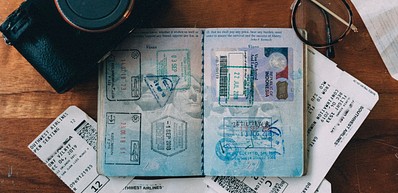
-
![Taxi circulating near the Door of the Millennium]() Provided by: Salvador Aznar/shutterstock
Provided by: Salvador Aznar/shutterstock

Our travel guides are free to read and explore online. If you want to get your own copy, the full travel guide for this destination is available to you offline* to bring along anywhere or print for your trip.
*this will be downloaded as a PDF.Price
€4,95
Taxi
The guide was updated:Taxis are ubiquitous in Dakar and can be flagged down anywhere. They are fast and safe as well, but you must haggle and agree on the fare before getting in. Taxis can also be caught in front of major hotels. They are usually yellow and black with a printed number on the side.
Useful Information
Digital Travel Guide Download
Our travel guides are free to read and explore online. If you want to get your own copy, the full travel guide for this destination is available to you offline* to bring along anywhere or print for your trip.
*this will be downloaded as a PDF.Price
€4,95

Citizens of the following countries can visit Senegal visa-free for a stay of up to 90 days: the European Union citizens, Benin, Brazil, Burkina Faso, Canada, Cape Verde, Central African Republic, Congo, Côte d'Ivoire, Djibouti, Gambia, Ghana, Guinea, Guinea-Bissau, India, Japan, Kenya, Liberia, Malaysia, Mali, Mauritius, Niger, Nigeria, Sierra Leone, Singapore, South Korea, Togo, Tunisia, United States. They need a passport that is valid for at least 3 months from the date of arrival.
Citizens of most other countries can obtain a 30-day visa on arrival, provided their passport is valid for at least the next 6 months.
Note that evidence of return or onward travel may have to be presented in order to enter the country. A certificate of vaccination against yellow fever might also be necessary if travelling from endemic countries.
If you're not sure whether or not to apply for a visa, we recommend that you contact the embassy or consulate in your country.
Read more

Best Time to Visit
The best time to visit Dakar is during the dry season, namely from November through May, when the average temperature is around 20°C/68°F and rain is basically non-existent. Of course, this is also the high season. The period from June through October is the wet season, with hot, humid days and frequent rainfall. During this period, you can find good deals and still have a pleasant stay, but be prepared that business may be closed.
Read more

Blaise Diagne International Airport (DSS)
The new airport serving the city of Dakar is the Blaise Diagne International Airport (IATA code: DSS), which is located about 43 km (27 mi) east of the city centre. Blaise Diagne International Airport is a modern and well-equipped facility that opened in 2017 to replace Léopold Sédar Senghor International Airport as the main airport serving Dakar and the surrounding region.
The airport has a single terminal building that serves both domestic and international flights, and offers a range of amenities and services for travellers, including shops, restaurants, and lounges, as well as a number of banks and currency exchange offices. The airport also has a range of transportation options for travellers, including car rentals, taxis, public buses and a train called Train Express Regional (TER).
Read more

Public Transport
Navigating public transport in Dakar may initially seem daunting because of its apparent disarray. The city's streets are awash with colour, mirroring the vivid hues of the local buses. Traditional attire, particularly the wax fabric dresses worn by women, adds to the kaleidoscope of colours.
Dakar's public bus system is called Dakar Dem Dikk. It is relatively reliable and very affordable, but the bus network can be very difficult to figure out if you're not already familiar with it. Be sure to ask a local if you're not sure which bus to take to get where you're going.
Public buses, distinguishable by their blue paint and numbering, are a common sight. While affordable, with fares around 200 CFA francs, they require some getting used to. Routes are not clearly mapped, and schedules are unpredictable, leading to sporadic service. Despite these challenges, these buses are a mainstay for locals, connecting various parts of the city, including the airport.
In contrast, the multicoloured buses, a more informal mode of transport, offer a different experience. Fares range from 50 to 100 CFA francs, depending on the distance. These buses are typically crowded, with passengers boarding from the rear and finding space wherever possible. Vigilance is advised, as the close quarters can lead to petty theft.
Read more

Taxi
Taxis are ubiquitous in Dakar and can be flagged down anywhere. They are fast and safe as well, but you must haggle and agree on the fare before getting in. Taxis can also be caught in front of major hotels. They are usually yellow and black with a printed number on the side.
Read more

Post
La Poste Senegal is the public company in charge of postal services in Senegal, with several offices in Dakar. The central post office is located along Boulevard El Hadji Djily Mbaye.
Read more

Pharmacies
Pharmacie Nelson Mandela
12 Avenue Nelson Mandela, Plateau, Dakar
Open 24h
+221 33 821 21 72
Pharmacie Guigon
Avenue du Président Lamine Gueye, Dakar
Open Mon–Sat 7:30am–10:30pm, Sun closed
+221 33 823 03 33
Pharmacie Mame Oumy Gueye
Sacré Coeur 71, Dakar
Open Mon–Sat 8:30am–11pm, Sun 9am–10pm
+221 33 825 59 99
Read more

Telephone
Country code: +221
Area code: 8
Read more

Electricity
Senegal uses type C, D, E and K power plugs and sockets. All four types use round pins. The standard voltage is 230 V at a frequency of 50 Hz.
Read more


